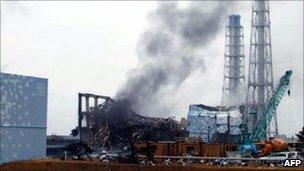Will Fukushima spell Tepco's doom?
- Published

Tepco has had to resort to blackouts and power outages as it faces a shortage of power supply
Every time a light is switched on in Tokyo, it is powered by the Tokyo Electric Power Company (Tepco).
And the chances are the Japanese cars we drive, the television sets from Japan in living rooms across the world and the Japanese game consoles used by children globally have been produced using electricity generated at one of Tepco's plants.
Formed in 1951, the company has literally powered Japan's industrial revolution and in the process gone on to become the fourth-largest power company in the world.
Ironically, it has also given Japan one of its worst nuclear disasters, which may also result in its own downfall.
Supply concerns
Tepco supplies about one-third of Japan's electricity.
Some of Japan's most densely populated and economically important areas get their power supply from Tepco.
Its Fukushima Daiichi nuclear plant was damaged by the earthquake and tsunami that hit Japan's north-east coast, resulting in a loss of power supply.
It has developed into a nightmare for the company, with the nuclear crisis adding to its woes.
While its workers may still be able to control the radiation leaks and rein in the crisis, the company is facing a daunting task to replenish the loss of energy from the reactors.
Analysts say the damage at the plant may see reactors being shut down and the crisis will make it difficult for Tepco to use nuclear energy as a power source for some time to come.
"It's almost unthinkable that any local government will accept a nuclear plant in their backyard," said Martin Schulz of Fujitsu Research in Tokyo.
That means Tepco will have to fall back on traditional sources of power generation such as coal and fuel, which will make its operations more expensive and hurt profits.
Analysts say Tepco's problems will intensify if the firm has to build new infrastructure to meet power demand.
"They will have to first push their capacities for conventional production," said Mr Schulz. "They will also have to put in place new power plants, pushing up costs further."
Market share
One way of making up for the increased cost of production is to increase the price of electricity.
While Tepco enjoys a monopoly in the Tokyo region, analysts say that it may not increase electricity rates in the short term, given the damage caused to the nation by the earthquake and tsunami.
There has also been a debate going on whether more companies should be allowed to operate in the same region.
"What is needed is the opening up of the Japan's energy markets, the regions are monopolised," said Mr Schulz.
"If the companies are allowed to import energy from other regions, the crisis can be handled much better."
However, Mr Schulz warned that if the monopoly was broken, it could make it difficult for Tepco to raise rates, as the consumer would have a choice of suppliers.
That, in turn, could cause its market share to decline, having a negative impact on profits.
Financial damage
Tepco has lost almost half of its market value as its share price has slumped in the aftermath of the Fukushima crisis.
Known for giving good returns and dividends to its shareholders, the company has said it is not sure of what dividend it will pay for the financial year.
It had earlier forecast a dividend of 60 yen per share.
The company is also facing a huge repair bill as it tries to limit the damage at the Fukushima Daiichi plant. Various factors are contributing to the costs.
First and foremost, it is the infrastructure damage that has been caused at the plant.
Then there is the looming threat of a shutdown of reactors.

The crisis at the Fukushima Daiichi plant is turning into one of Japan's worst nuclear disasters
The company also has to account for the loss in revenue due to power outages and rolling blackouts as it faces a shortage of power supply.
In the middle of all this, there are reports that it is in talks with some of Japan's biggest banks to seek $25bn (£15bn) in emergency loans.
Analysts say while the collapse in its market value is a concern, investors can take respite from the fact that the authorities are backing the company.
"One suspects that the government has implicitly guaranteed the survival of Tepco as a regulated entity if all these institutions are willing to accept the risk," said Penn Bowers of CLSA Asia-Pacific Markets in Tokyo.
"The need to prevent a crisis of confidence could be seen as necessary to keep recovery efforts stable," he added.
While the recovery efforts go on, investors and markets wait with bated breath to see how things will pan out.
No-one is quite sure what the future holds for one of Japan's biggest icons, but one thing is certain - it will never be the same again.
- Published23 March 2011
- Published22 March 2011
- Published16 March 2011